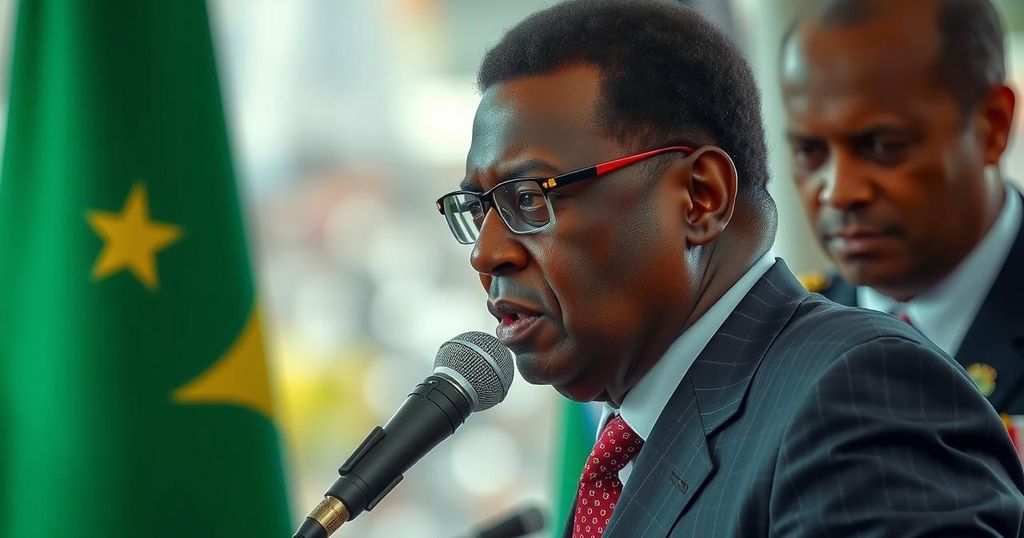Macky Sall’s Controversial Political Comeback From Abroad in Senegal

Macky Sall, the former president of Senegal, is attempting a political comeback during the upcoming snap parliamentary elections while residing in Morocco. His return follows significant unrest and the postponement of the presidential election earlier this year. Sall’s newly formed opposition coalition raises questions about his motives and the political landscape of Senegal, especially in light of accusations regarding his administration’s financial legacy.
In an unprecedented move, former Senegalese President Macky Sall is attempting a political comeback from Morocco where he has been residing since leaving office in April after 12 years in power. His return coincides with the upcoming snap parliamentary elections, raising concerns regarding the implications of his actions for the Senegalese political landscape. Sall has established an opposition coalition named Takku Wallu Senegal and has justified his resurgence by emphasizing the need to safeguard his administration’s legacies amid accusations from his political adversaries, including Prime Minister Ousmane Sonko, who has accused him of financial mismanagement and authoritarian governance.
Sall’s political revival comes after a tumultuous period marked by his decision to postpone the February presidential election, which incited significant unrest and governmental challenges. His successor, Bassirou Diomaye Faye, suffered a crushing defeat at the polls, signaling a public desire for change. Sall’s participation in the political arena from abroad poses questions about his motives and the potential ramifications for the nation, especially given the potential for legal challenges arising from his time in office, as highlighted by Sonko’s remarks linking the former president to severe public finance crises.
Furthermore, political analysts, including Maurice Soudieck Dione and El Hadji Mamadou Mbaye, speculate about Sall’s ambitions and his motivations for maintaining a central role in Senegalese politics, suggesting he may seek to shield himself from possible judicial repercussions linked to his previous term. The government has assured Sall of his safety if he returns, yet the specter of legal action looms, particularly as the climate of political confrontation intensifies. As election day approaches, Sall’s and Sonko’s competing narratives reflect the broader discontent of a populace grappling with economic challenges and political instability.
Sall’s actions represent a departure from the conventions observed by previous Senegalese leaders, and the political world is abuzz with speculation regarding his future impact on the nation’s governance and the potential for renewed conflict.
The political climate in Senegal has been volatile since Macky Sall’s tenure, which included significant unrest and public dissatisfaction stemming from various governance issues. The postponement of the presidential elections earlier this year intensified frustrations among citizens and political organizations, leading to widespread protests and unrest. Following Sall’s departure from the presidency, opposition figures have gained ground, igniting fierce political competition and debate over the country’s future trajectory. Sall’s decision to remain politically active while abroad raises myriad questions about accountability and the direction of Senegal’s governance, particularly as citizens navigate economic difficulties. Political analysts suggest that Sall’s return may not only be a reflection of his perceived indispensability but also a strategic maneuver to prepare for potential legal and political repercussions. This backdrop establishes the complex interplay between former leaders and current political dynamics, emphasizing the urgency of understanding the motivations driving Sall back into the limelight.
Macky Sall’s re-entry into the Senegalese political sphere represents an unprecedented development that challenges the existing political order. His actions from abroad, coupled with accusations from his critics regarding his previous administration’s governance issues, have the potential to reshape the political landscape significantly. As Senegal approaches its parliamentary elections, the implications of Sall’s return will undoubtedly resonate deeply within the populace, highlighting the persistent undercurrents of discontent that may influence voter sentiment and future political stability.
Original Source: www.arabnews.com







